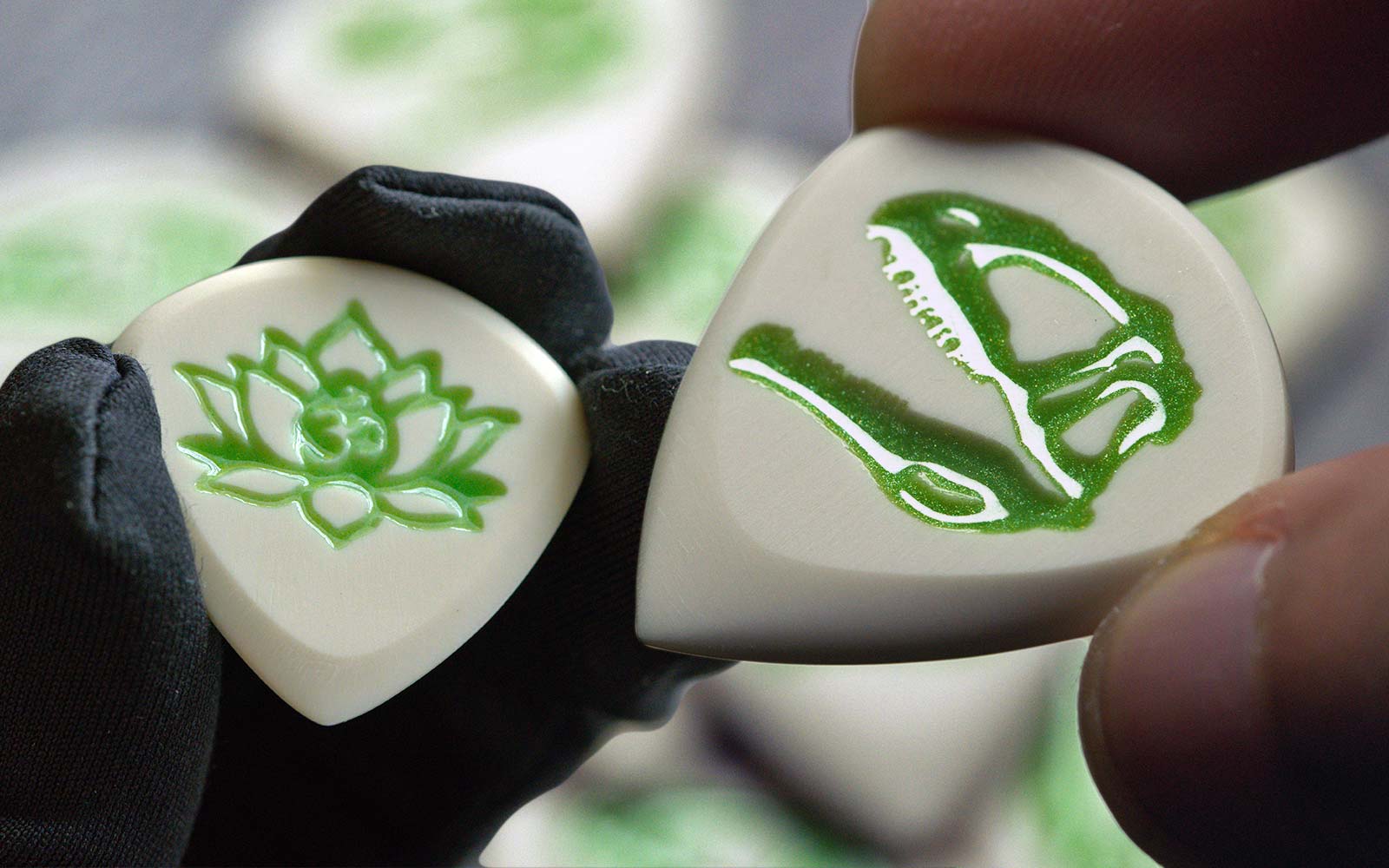Wooden Guitar Picks: The Basics You Need To Know
by Alex Rodea June 14, 2024
Wooden guitar picks are a unique alternative to traditional guitar picks made from plastic or metal, providing a unique tonal quality & a personalized playing experience.
This blog post explores their benefits, craftsmanship, different types of wood used, and their distinctive tonal characteristics.
It also shares tips on caring for wooden picks to ensure their longevity & performance and commonly asked questions.

Related: Should you use a guitar pick or fingers for bass?
Benefits of Wooden Guitar Picks
Wooden guitar picks offer a unique alternative to regular picks, offering warm tonal characteristics that enhance the natural resonance of the guitar. They can add depth & richness to acoustic guitar performances, while also providing versatility and enhanced grip for electric guitar players. Here's a few things that stand out:
Variations in Tone
Wooden guitar picks have a variety of effects on tone. To begin with, the density and composition of the wood can change the attack and sustain of each note, resulting in a distinct tonal response. Second, wooden picks produce a warmer, more natural tone, which adds richness and depth to the sound.
Furthermore, subtle differences in grain patterns and texture of different woods can impart distinct tonal coloration. Finally, the flexibility and responsiveness of wooden picks can affect dynamics and articulation, providing a more nuanced and expressive playing experience.
Enhanced Grip, Comfort, Control
Wooden picks frequently provide a better grip & a more satisfying tactile experience. They tend to be much stiffer than traditional plastic picks as well, which give much more control and articulation to each individual note.
They also feature a naturals grip that can be further enhanced with coarse sanding, grip holes, or engravings. The overall thickness of these types of picks can also greatly enhance the comfort in holding them.
Customization & Personalization
Wooden picks can be personalized & customized to meet specific needs. Handcrafted wooden picks are available from many artisans and luthiers, allowing musicians to select the size, thickness, and guitar pick shape that best suits their playing style.
Additionally, some artisans offer personalized engravings, making each purchase a one-of-a-kind work of art. This personalization gives musicians the ability to express their creativity and individuality.
Versatility
Wooden picks are versatile & suitable for a wide range of playing styles and genres. They can generate rich, mellow tones for acoustic strumming or a distinct attack for electric guitar solos. To achieve the desired tonal characteristics and explore new sonic possibilities, musicians can experiment with various types of wooden picks.
Sustainability & Eco-Friendliness
Wooden picks are often thought to be more environmentally friendly than plastic picks. Wood is a renewable resource, and using wooden picks with care can have a lower environmental impact. This aspect appeals to musicians who care about the environment & want to align their musical choices with their values.
In conclusion, wooden guitar picks provide advantages such as warm and organic tone, improved grip and tactile experience, customization and personalization options, versatility across playing styles, and durability.
These benefits make wooden picks an appealing option for musicians seeking to add depth & character to their music while taking a more personalized and environmentally conscious approach to their craft.
Related: Differences found in guitar picks

Types of Wood Used To Make Them
Different types of wood are used in the production of wooden guitar picks, each with its own unique characteristics. One of the most important factors to consider however, is the hardness of the wood being used. This will affect the durability & also some of the tonal properties of the pick.
Janka Hardness Rating
Janka hardness is a measurement of the hardness & durability of wood species commonly used in flooring, furniture, and even musical instruments.
It's the amount of force required to embed a steel ball into a wood species, indicating its resistance to denting and wear.
A higher Janka hardness rating, expressed in pounds-force (lbf), indicates a harder and more durable wood, while a lower rating indicates a softer wood.
This measurement aids in decision-making when selecting wood for specific applications, ensuring that the chosen material can withstand the demands of its intended use while maintaining structural integrity over time.
You can check the hardness rating & learn more about different types of wood here.
Common Timber Used
Brazilian Rosewood
Rosewood picks have a smooth, balanced sound and are known for their rich and warm tones which is a reason its selected for guitar fretboards. They are frequently used for acoustic playing and can enhance the depth and complexity of the natural tone of the instrument. 2,790 lbf
Macassar Ebony
Ebony picks are some of our personal favorites and have a distinct & articulate sound. They have a strong attack and are extremely responsive, making them suitable for a variety of playing styles. Macassar ebony picks add clarity and definition to both acoustic and electric guitar playing. If durability is a concern, this type of wood should be definitely be considered.3,220 lbf
Related: Iron Age Macassar Ebony Spearhead Guitar Picks
Hard Maple
Maple is an abundant material which makes it great for sustainability. They produce a well-balanced sound with a strong attack and excellent note definition. Maple picks have excellent articulation as many other wood picks, making them suitable for a wide range of genres and for starters. 1,450 lbf
Black Walnut
Walnut picks produce a warm, mellow tone with a well-balanced resonance. They have a smooth and rounded sound, which makes them popular among acoustic guitarists. Walnut picks can improve the overall character of an instrument by adding warmth and depth to its tone. One drawback is that they can be on the softer side compared to other wood picks. 1,010 lbf
Cocobolo
Cocobolo picks are well-known for their vibrant and deep colors. They are extravagant & play as good as they look. Cocobolo picks can add a unique flavor to both acoustic and electric guitar playing.2,960 lbf
Padauk
Padauk picks feature a bright reddish hue that darkens as it ages. They offer a vibrant tone with a uniform feel to the grain. They have a lighter feel as well which is contrasted by something heavier like ebony. 1,970 lbf
It's worth noting that the characteristics of wooden picks can vary not only based on the type of wood used but also on factors such as the thickness, shape& overall finish.
Experimenting with different wood types and pick designs can allow musicians to discover the specific tones and responses that best suit their play style.
Craftsmanship & Artistry Involved
Merging Tradition w/ Innovation
Making wooden guitar picks is a fine art that combines traditional woodworking techniques with new ideas. Wooden pick artisans bring a deep understanding of wood characteristics as well as a passion for enhancing the musical experience. They combine their knowledge with a creative vision to create picks that are both functional & aesthetically pleasing.
Handcrafted guitar picks are frequently the result of a meticulous process that begins with the selection of high-quality wood. Wood species known for their desirable tonal qualities & durability are carefully selected by artisans. They may even experiment with different wood combinations to achieve specific sonic characteristics or aesthetic.
Related: How Iron Age Wood Picks Are Made
Techniques & Tools Employed by Artisans
Wood Selection & Preparation
Artisans select wood with suitable grain patterns, stability, and tonal qualities. They carefully prepare the wood by drying it to the optimal moisture content to ensure stability & minimize the risk of warping or cracking.
Shaping & Carving
Artisans employ various shaping techniques to transform raw wood into pick blanks. This can involve the use of precision sawing, routing, filing, or carving tools to achieve the desired size, thickness, and shape. The pick's edges are carefully beveled or contoured to optimize playability & tonal response.
Finishing & Polishing
Once the desired shape is achieved, artisans meticulously refine the surface of the pick. This process may involve sanding, buffing, and polishing to achieve a smooth finish. Some artisans may also apply protective coatings, such as natural oils or varnishes, to enhance the pick's durability and appearance.
Personally, we like to use a combination of orange oil, beeswax, & a final seal of micro-crystalline wax. This helps to bring out the colors, enhance the sheen of polished areas, and add a protective layer to the wood.
Customization & Engravings
Some vendors can also offer customization options, allowing musicians to personalize their picks. This can include engraving names, logos, or intricate designs onto the picks, making each piece unique and reflective of the musician's identity. We offer a personalized pick engraving service here.
Craftsmen can use a variety of specialized hand tools, such as chisels, carving knives, files, sanding blocks, and even CNC equipment, throughout the entire process. These tools necessitate precision, skill, and specialized knowledge in order to accurately shape the wood and achieve the desired aesthetic and functional qualities.
Caring for Wooden Picks
Much like a guitar or other wooden items, this type of plectrum also has some things to consider in order to keep them in tip-top shape. Here are some tips to help you care for and store your wooden picks properly:
Keep them clean
After each use, wipe your wooden picks with a soft cloth to remove any dirt, sweat, or oils that may have accumulated. This helps to maintain their appearance and prevents build-up that could affect their performance.
Avoid excessive moisture & humidity
Wooden picks are sensitive to moisture and humidity, which can cause warping or cracking. Store them in a dry and moderate environment, away from direct sunlight or areas prone to moisture. Consider using a pick case or pick holder to provide additional protection.
Use a dedicated pick holder
Investing in a pick tray, pick holder, or a case specifically designed for storing guitar picks can help protect your wooden picks from external damage. These cases provide a secure and organized space to store your picks, preventing them from getting lost or damaged.
Store them flat or upright
When not in use, store your wooden picks either flat or upright in a designated container. This helps to maintain their shape and prevents them from getting bent or damaged.
Avoid extreme temperatures
Extreme temperature changes can affect the stability & shape of wooden picks and cause them to dry out. Avoid exposing them to extreme heat or cold, such as leaving them in a car during hot summer days or near heating vents during winter.

Renewing & Revitalizing Worn-out Picks
Over time, wooden picks may show signs of wear and tear. However, with proper care, you can extend their lifespan and revitalize their performance. Here are a few suggestions:
Sanding & reshaping
If your pick becomes worn or develops rough edges, you can use sandpaper to smooth and reshape it. Be gentle and maintain the original contour as much as possible, ensuring a comfortable grip and optimal playing experience.
We recommend using 220 grit to re-shape your pick & something around 400-600 to further smooth it out if desire. Finally you can buff or polish it using a cotton wheel or a dremel tool if available.
Conditioning the wood
Wooden picks can dry out so periodically conditioning them can help preserve their integrity. Applying a small amount of wood conditioner or oil specifically designed for musical instruments can nourish the wood and enhance its durability. Follow the manufacturer's instructions and use sparingly to avoid excessive buildup & use a soft microfiber to remove any excess.
Consider pick rotation
Regularly rotating your picks during practice or performances can distribute the wear more evenly. This helps prevent excessive wear on a single pick and extends the overall lifespan of your collection.
By following these maintenance and care procedures, you can ensure that your wooden picks remain in excellent condition, providing optimal performance and longevity. Remember that treating your picks with care and attention will allow you to enjoy the unique qualities they bring to your playing for many years to come.

Frequently Asked Questions
What wood is best for guitar picks?
Different types of wood will produce their own distinct characteristics, but when it comes to durability, the best type of wood we recommend is something with a higher durability rating. This can be something like Iron Wood, Ebony, Lignum Vitae, etc.
Related: Top 10 Best Guitar Picks by Iron Age
Are wooden or metal guitar picks better?
In terms of durability, metal guitar picks are better without a doubt. However as far as playability goes, we recommend you try both & see what feels better for you. You might find that wooden picks are more nimble & produce a more palatable tone for you. It will all come down to preference.
Related: Guitar plectrums for playing metal, what to look for
Do thicker guitar picks sound better?
Guitar pick thickness can influence feel and sound, but so can pick shape and material. Thick guitar picks are generally more comfortable to hold and can provide more grip, but as far as sound goes, we recommend experimenting for yourself because it's a personal preference.
What is the best guitar pick shape for beginners?
If you're just starting out as a new guitar player, you can't go wrong with a Fender 351 shaped guitar pick. Another one that's very popular is the Jazz3 pick shape. Try both out & see what feels & sounds best for your style of playing.
Related: Some of the best guitar picks for beginners
What is the longest lasting guitar pick material?
In terms of practicality, Ultem is the longest lasting guitar pick material. It's widely available in mass produced picks but also in more premium forms such as in our Gladiator Ultem Picks.
Conclusion
Wooden guitar picks offer a harmonious blend of nature's touch & musical expression. They provide a distinct tonal character as well as eco-friendliness and craftsmanship. By embracing the charm and benefits of wooden guitar picks, you can unlock a new world of sonic possibilities and infuse you music with a touch of natural beauty.
Also in Iron Age || General Blog

The 3 Best Engraved Guitar Picks to Personalize Your Playing Experience
by Alex Rodea March 20, 2025
Engraved guitar picks add both style and function, offering extra grip and a personal touch with custom initials, logos, or messages. Whether you're looking for a unique gift or a pick that stands out, check out our top choices and grab your first engraving for free with code...

Guitar Jack Not Working? Here's A Few Easy Steps To Fix Crackles & Pops
by Alex Rodea March 19, 2025

Mono vs Stereo Jacks: Key Differences & How to Wire Them
by Alex Rodea March 06, 2025

The Best Acoustic Guitar Picks: Tips & Considerations For Newbies
by Alex Rodea March 06, 2025

The Best Guitar Picks For Bass: A Guide To Help You Choose
by Alex Rodea March 05, 2025

What is a Fret Wrap, String Muter, or String Dampener?
by Alex Rodea March 05, 2025
+Iron Age Blogs
For the latest news & announcements, check out our News & Updates Blog
For tips, tricks, & other informative articles, check out our General Guitar Blog
Become a newsletter subscriber to get the latest info on new blog articles, receive exclusive promo codes, and be notified of upcoming giveaways!
+Recent Articles
-
The 3 Best Engraved Guitar Picks to Personalize Your Playing Experience
March 20, 2025
-
Guitar Jack Not Working? Here's A Few Easy Steps To Fix Crackles & Pops
March 19, 2025
-
Mono vs Stereo Jacks: Key Differences & How to Wire Them
March 06, 2025
-
The Best Acoustic Guitar Picks: Tips & Considerations For Newbies
March 06, 2025
-
The Best Guitar Picks For Bass: A Guide To Help You Choose
March 05, 2025
-
What is a Fret Wrap, String Muter, or String Dampener?
March 05, 2025
-
Guitar String Names & How To Memorize Them
March 05, 2025
-
How To Make Wooden Guitar Picks: Ebony Spearhead
March 05, 2025
-
Top 3 Best Guitar Picks For Grip: Iron Age Edition
March 05, 2025
-
Are Guitar Picks Necessary? Exploring the Pros, Cons, and Playing Styles
March 05, 2025
+Affiliate Notice
Iron Age is a participant in the Amazon Services LLC Associates Program, an affiliate advertising program designed to provide a way for websites to earn advertising revenues by advertising and linking to Amazon.com
Iron Age Guitar Accessories
226 Douglas Way St
San Antonio, TX 78210
USA
⚔️
“Quality is never an accident. It is always the result of high intention, sincere effort, intelligent direction and skillful execution. It represents the wise choice of many alternatives.”
~William A. Foster (MOH Recipient, 1945)
Sign up for the Iron Age newsletter to Save 15% on your 1st order, plus get exclusive offers, product updates, and early access to giveaways!
© 2025 Iron Age Guitar Accessories.
Est 2015.


Alex Rodea
Author
Founder of Iron Age, my guitar journey began in 2006, fueling a passion for crafting premium guitar accessories that embody timeless style & innovative expression. Through my Stay Tuned Guitar site I also share tips & info for new guitarists, offering everything from beginner tutorials to DIY tips & general music knowledge.